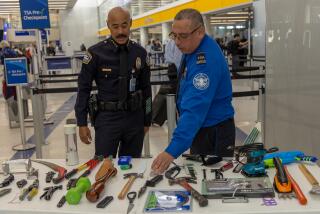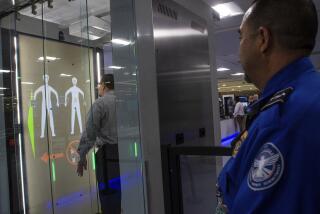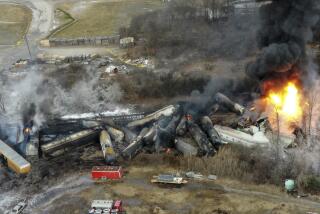TSA to test its airport scanner operators for radiation exposure
After years of rebuffing health concerns over airport scanners, the Transportation Security Administration plans to conduct new tests on the potential radiation exposure from the machines at more than 100 airports nationwide.
But the TSA does not plan to retest the machines or passengers. Instead, the agency plans to test its airport security officers to see if they are being exposed to dangerous levels of radiation while working with the scanners.
News of the test leaked out after the TSA issued a request last month to government vendors to provide wearable, personal dosimeters, devices that measure exposure to radiation.
“TSA is dedicated to the health and safety of its employees,” TSA spokesman Nico Melendez said. “We continuously test our technology to ensure it is safe for both passengers and our officers and post all results to our website.”
Critics of the TSA support the idea of testing TSA workers. But they continue to call on the TSA to perform independent studies of the full-body scanners to ensure that airline passengers are not being exposed to dangerous levels of radiation.
“We still have no idea how much radiation is being imposed on travelers by a properly functioning machine,” said James Babb, co-founder of We Won’t Fly, a consumer advocacy group. “A malfunctioning machine could be particularly nasty.”
Melendez said the scanners have been tested and approved by the National Institute of Occupational Safety and Health and the U.S. Army Public Health Command.
In fact, TSA Administrator John Pistole backed away from plans for new testing in November because he said he received a draft report from the inspector general of the Homeland Security Department that confirmed the conclusion of previous independent studies that the scanners are safe for all passengers.
•2012 is expected to be a good year for travel industry
The travel industry, as well as home improvement stores and credit card companies, should have a good year in 2012, according to a new spending survey.
The top two areas for discretionary spending among Americans are home improvements and travel, according to a new survey of 2,000 Americans for American Express. And, as expected, many say they would use their credit cards to pay those costs.
More than 8 in 10 of those who plan to travel for leisure in 2012 said they will spend the same amount of money as or more than last year, according to the report. In fact, 17% had in December already booked their first trip of the year.
“The survey suggests good news for the travel industry,” said Claire Bennett, senior vice president and general manager of American Express Travel. “Consumers are planning to invest more in travel, and nearly a quarter are setting aside a separate travel budget to help them meet their 2012 travel goals.”
Young professionals are expected to hit the road in big numbers. Fifty-seven percent of those under age 30 who were surveyed said they would spend more on travel in 2012, according to the survey, compared with 43% of all survey participants, according to the survey.
When it comes to paying for their vacations, 24% of Americans said they would rely on money they set aside for travel, while 23% said will use credit cards, according to the survey.
More men (22%) said they planned to pay for the vacation with savings than women (16%).
•Outrage at baggage fees spawns a business
Brent Hopkins, a Michigan marketing manager, was so annoyed that a carry-on suitcase cost him $90 in baggage fees on Spirit Airlines that he launched a business to help other passengers the charges.
The Florida airline in 2010 introduced a fee of up to $45 for carry-on luggage that cannot fit in the space under the seats. The fee met with outrage, including threats from several lawmakers to impose a special tax on revenue collected from such fees.
Instead of fuming, Hopkins created CarryOn Free, an online company that manufactures suitcases that fit the exact dimensions of the space under Spirit seats.
The suitcases sell on the website carryonefree.com for about $55 plus shipping. Hopkins said they are priced to pay for themselves after only one round-trip flight on Spirit.
“I saw an opportunity,” he said, “and a chance to meet a need.”






